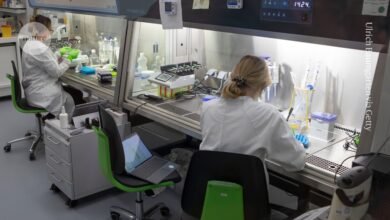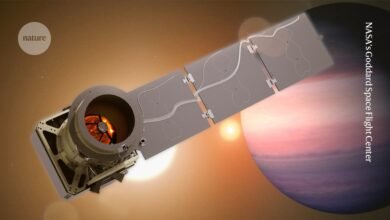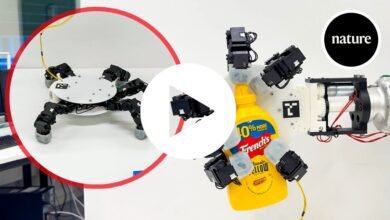Cosmai, L. et al. Preventive strategies for acute kidney injury in cancer patients. Clin. Kidney J. 14, 70–83 (2021).
Cedervall, J. et al. Pharmacological targeting of peptidylarginine deiminase 4 prevents cancer-associated kidney injury in mice. Oncoimmunology 6, e1320009 (2017).
Song, W. et al. Tumor-derived ligands trigger tumor growth and host wasting via differential MEK activation. Dev. Cell 48, 277–286.e276 (2019).
Cohen, E., Sawyer, J. K., Peterson, N. G., Dow, J. A. T. & Fox, D. T. Physiology, development, and disease modeling in the Drosophila excretory system. Genetics 214, 235–264 (2020).
Janus, N. et al. Cancer and renal insufficiency results of the BIRMA study. Br. J. Cancer 103, 1815–1821 (2010).
Launay-Vacher, V. Epidemiology of chronic kidney disease in cancer patients: lessons from the IRMA study group. Semin. Nephrol. 30, 548–556 (2010).
Ding, G. et al. Coordination of tumor growth and host wasting by tumor-derived Upd3. Cell Rep. 36, 109553 (2021).
Kwon, Y. et al. Systemic organ wasting induced by localized expression of the secreted insulin/IGF antagonist ImpL2. Dev. Cell 33, 36–46 (2015).
Chen, Y. et al. Renal NF-κB activation impairs uric acid homeostasis to promote tumor-associated mortality independent of wasting. Immunity 55, 1594–1608.e1596 (2022).
Bilder, D., Ong, K., Hsi, T. C., Adiga, K. & Kim, J. Tumour–host interactions through the lens of Drosophila. Nat. Rev. Cancer 21, 687–700 (2021).
Yeom, E. et al. Tumour-derived Dilp8/INSL3 induces cancer anorexia by regulating feeding neuropeptides via Lgr3/8 in the brain. Nat. Cell Biol. 23, 172–183 (2021).
Dong, J. et al. Serum insulin-like growth factor binding protein 2 levels as biomarker for pancreatic ductal adenocarcinoma-associated malnutrition and muscle wasting. J. Cachexia Sarcopenia Muscle 12, 704–716 (2021).
Kandarian, S. C. et al. Tumour-derived leukaemia inhibitory factor is a major driver of cancer cachexia and morbidity in C26 tumour-bearing mice. J Cachexia Sarcopenia Muscle 9, 1109–1120 (2018).
Gautam, N. K., Verma, P. & Tapadia, M. G. Drosophila Malpighian tubules: a model for understanding kidney development, function, and disease. Results Probl. Cell Differ. 60, 3–25 (2017).
Denholm, B. et al. The tiptop/teashirt genes regulate cell differentiation and renal physiology in Drosophila. Development 140, 1100–1110 (2013).
Cabrero, P. et al. Chloride channels in stellate cells are essential for uniquely high secretion rates in neuropeptide-stimulated Drosophila diuresis. Proc. Natl Acad. Sci. USA 111, 14301–14306 (2014).
Cabrero, P. et al. Specialized stellate cells offer a privileged route for rapid water flux in Drosophila renal tubule. Proc. Natl Acad. Sci. USA 117, 1779–1787 (2020).
Zandawala, M. et al. Modulation of Drosophila post-feeding physiology and behavior by the neuropeptide leucokinin. PLoS Genet. 14, e1007767 (2018).
Yoshida, M., Matsuda, H., Kubo, H. & Nishimura, T. Molecular characterization of Tps1 and Treh genes in Drosophila and their role in body water homeostasis. Sci. Rep. 6, 30582 (2016).
Lee, J., Ng, K. G., Dombek, K. M., Eom, D. S. & Kwon, Y. V. Tumors overcome the action of the wasting factor ImpL2 by locally elevating Wnt/Wingless. Proc. Natl Acad. Sci. USA 118, e2020120118 (2021).
Pagliarini, R. A. & Xu, T. A genetic screen in Drosophila for metastatic behavior. Science 302, 1227–1231 (2003).
Dircksen, H., Tesfai, L. K., Albus, C. & Nassel, D. R. Ion transport peptide splice forms in central and peripheral neurons throughout postembryogenesis of Drosophila melanogaster. J. Comp. Neurol. 509, 23–41 (2008).
Galikova, M., Dircksen, H. & Nassel, D. R. The thirsty fly: Ion transport peptide (ITP) is a novel endocrine regulator of water homeostasis in Drosophila. PLoS Genet. 14, e1007618 (2018).
Nagai, C., Mabashi-Asazuma, H., Nagasawa, H. & Nagata, S. Identification and characterization of receptors for ion transport peptide (ITP) and ITP-like (ITPL) in the silkworm Bombyx mori. J. Biol. Chem. 289, 32166–32177 (2014).
Bhargava, Y. et al. Improved genetically-encoded, FlincG-type fluorescent biosensors for neural cGMP imaging. Front. Mol. Neurosci. 6, 26 (2013).
Kerr, M., Davies, S. A. & Dow, J. A. Cell-specific manipulation of second messengers; a toolbox for integrative physiology in Drosophila. Curr. Biol. 14, 1468–1474 (2004).
Massaro, R. C. et al. The mechanism of action of the antidiuretic peptide Tenmo ADFa in Malpighian tubules of Aedes aegypti. J. Exp. Biol. 207, 2877–2888 (2004).
Wiehart, U. I., Nicolson, S. W., Eigenheer, R. A. & Schooley, D. A. Antagonistic control of fluid secretion by the Malpighian tubules of Tenebrio molitor: effects of diuretic and antidiuretic peptides and their second messengers. J. Exp. Biol. 205, 493–501 (2002).
Sajadi, F., Curcuruto, C., Al Dhaheri, A. & Paluzzi, J. V. Anti-diuretic action of a CAPA neuropeptide against a subset of diuretic hormones in the disease vector Aedes aegypti. J. Exp. Biol. 221, jeb177089 (2018).
Ruka, K. A., Miller, A. P. & Blumenthal, E. M. Inhibition of diuretic stimulation of an insect secretory epithelium by a cGMP-dependent protein kinase. Am. J. Physiol. 304, F1210–F1216 (2013).
Davies, S. A. et al. Cell signalling mechanisms for insect stress tolerance. J. Exp. Biol. 217, 119–128 (2014).
Li, H. et al. Fly Cell Atlas: a single-nucleus transcriptomic atlas of the adult fruit fly. Science 375, eabk2432 (2022).
Hu, Y., Comjean, A., Perkins, L. A., Perrimon, N. & Mohr, S. E. GLAD: an online database of gene list annotation for Drosophila. J. Genomics 3, 75–81 (2015).
Xu, J. et al. Transcriptional and functional motifs defining renal function revealed by single-nucleus RNA sequencing. Proc. Natl Acad. Sci. USA 119, e2203179119 (2022).
Birse, R. T., Johnson, E. C., Taghert, P. H. & Nassel, D. R. Widely distributed Drosophila G-protein-coupled receptor (CG7887) is activated by endogenous tachykinin-related peptides. J. Neurobiol. 66, 33–46 (2006).
Song, W., Veenstra, J. A. & Perrimon, N. Control of lipid metabolism by tachykinin in Drosophila. Cell Rep. 9, 40–47 (2014).
Uhlen, M. et al. Tissue-based map of the human proteome. Science 347, 1260419 (2015).
Baltgalvis, K. A. et al. Interleukin-6 and cachexia in ApcMin/+ mice. Am. J. Physiol. Regul. Integr. Comp. Physiol. 294, R393–R401 (2008).
Zhang, W. W., Wang, Y. & Chu, Y. X. Tacr3/NK3R: beyond their roles in reproduction. ACS Chem. Neurosci. 11, 2935–2943 (2020).
Guo, T. et al. Association between hyperpolarization-activated channel in interstitial cells of Cajal and gastrointestinal dysmotility induced by malignant ascites. Oncol. Lett. 13, 1601–1608 (2017).
Kir, S. et al. Tumour-derived PTH-related protein triggers adipose tissue browning and cancer cachexia. Nature 513, 100–104 (2014).
Huot, J. R., Novinger, L. J., Pin, F. & Bonetto, A. HCT116 colorectal liver metastases exacerbate muscle wasting in a mouse model for the study of colorectal cancer cachexia. Dis. Model Mech. 13, dmm043166 (2020).
Das, S. K. et al. Adipose triglyceride lipase contributes to cancer-associated cachexia. Science 333, 233–238 (2011).
Franchet, A., Niehus, S., Caravello, G. & Ferrandon, D. Phosphatidic acid as a limiting host metabolite for the proliferation of the microsporidium Tubulinosema ratisbonensis in Drosophila flies. Nat. Microbiol. 4, 645–655 (2019).
Rossano, A. J. & Romero, M. F. Optical quantification of intracellular pH in Drosophila melanogaster malpighian tubule epithelia with a fluorescent genetically-encoded pH indicator. J. Vis. Exp. 11, 55698 (2017).
Leemans, J. C. et al. Renal-associated TLR2 mediates ischemia/reperfusion injury in the kidney. J. Clin. Invest. 115, 2894–2903 (2005).
Source link




